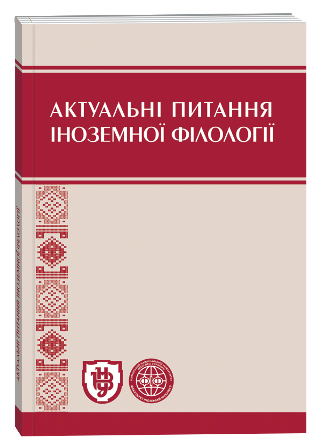THE FUNCTIONING OF THE CONCEPT OF “OTHERNESS” AND “SELFNESS” IN MODERN POLISH EMIGRATION LITERATURE
DOI:
https://doi.org/10.32782/2410-0927-2021-14-14Keywords:
Polish emigration literature, report, emigrant, development of other and foreign, conceptAbstract
In recent decades, the issue of cultural functioning of the emigrant abroad is considered important and relevant. In our opinion, the identity of a person, and especially the identity of an emigrant, can be most fully explored and presented on the example of the concept of “otherness” and “selfness”. Therefore, in the article we aim to present the image of an emigrant as a newcomer, outsider, non-native on the example of the reports of Ewa Winnicka “Angole”. Methods. In our work we use general scientific and linguistic methods. Using structural and descriptive methods, we collected, systematized and characterized the theoretical provisions related to the researched concept, comparative method was used in the analysis of this concept in the works of not only Polish but also other foreign researchers. Elements of the etymological method and the method of dictionary definitions were important in order to clarify the etymology of some Polish language phrases. Thanks to interpretive-textual and contextual methods, it was possible to study the functioning of the concept in the works of Polish emigration literature. In our study we also focus on the ethnocultural aspect of the concept, so we describe the concept as a model based on awareness of the importance of a particular national culture in the life of society and emigrants. Scientific novelty. For the first time in Polish and Ukrainian literary criticism, the functioning of this concept is analyzed. The functioning of the concept of “otherness” and “selfness”in the Polish emigration literature is analyzed on the example of Ewa Winnicka’s collection of reports „Angole”; the image of the emigrant as a stranger and / or another is presented through the prism of literature. In addition, we tried to determine the uniqueness of the „otherness” of the emigrant. The reasons for the exclusion of emigrants from public life due to their otherness have been studied. Conclusions. Emigrants’ misunderstanding of their (especially national) identity gives emigrants the belief that they are no longer members of the «normal world», that they will always be strangers, others, unaccepted, and therefore hostile to the society in which they live.
References
Колесов В. В. Мир человека в слове Древней Руси. Ленинград : Изд-во Ленингр. универ., 1986. 311 с.
Крістева Ю. Самі собі чужі. Київ : Основи, 2004. 262 с.
Кузнєцова Т. В. Концепт «свій – чужий» у лінгвокультурологічних дефініціях: Вісник Сумського державного університету. Сер. «Філологія». 2007. Вип. 2. С. 37–40.
Лотман Ю. М. Внутри мыслящих миров. Лотман Ю. М. Семиосфера. Санкт-Петербург : Искусство СПБ, 2000. 704 с.
Bauman Z. Ponowoczesność jako źródło cierpień. Warszawa, 2013. 389 s.
Dąbrowski M. Międzytekst. Literatura między kulturami narodowymi. Porównania. 2013. Nr 13. S. 93–105.
Dąbrowski M. Proza migracyjna: źródła i znaczenie. Teksty Drugie. 2016. Nr 3, S. 288–307.
Dąbrowski M. Tekst międzykulturowy. O przemianach literatury emigracyjnej. Warszawa, 2016. 342 s.
Głażewska E. Inny/obcy jako uosobienie diabła. Kultura i Historia. 2017. Nr 32. S. 132–145.
Inny słownik języka polskiego. T. I–II / рod red. M. Bańko. Warszawa : Wydawnictwo Naukowe PWN, 2000. 11. Kapuściński R. Ten Inny. Kraków, 2006, 92 s.
Kosek I. Kilka uwag o opozycji swój-obcy i jej wartościowaniu we frazeologii. Swojskość i obcość. O kategorii tożsamości w piśmiennictwie polskim na przełomie wieków. Olsztyn, 2004. S. 178–193.
Prokop-Janiec E. Ku wielokulturowości. Literatura emigracyjna jako literatura imigrantów. Proza polska na obczyźnie. T. I / red. Z. Anders, J. Pasterski, A. Wal. Rzeszów, Wydawnictwo UR. 2007. S. 37–50.
Słownik współczesnego języka polskiego. Pod red. B. Dunaja. Warszawa : Wydawnictwo Wilga, 1998.
Wielki słownik języka polskiego. T. I–X / red. W. Doroszewski – Warszawa, Państwowe wydawnictwo naukowe. 1958–1969. Електронна версія: https://www.wsjp.pl/
Winnicka E. Angole. Wołowiec, 2014.
Zamojska E. Inny jako Obcy. Imigranci w polskim dyskursie publicznym i edukacyjnym. Studia Edukacyjne. 2013. Nr 28. S. 191–208.
Ziętek Z. Czas literatury miejsca. Gry o tożsamość w czasach wielkiej zmiany / pod red. A. Wernera, T. Żukowskiego. Warszawa, 2013. S. 127–150.







